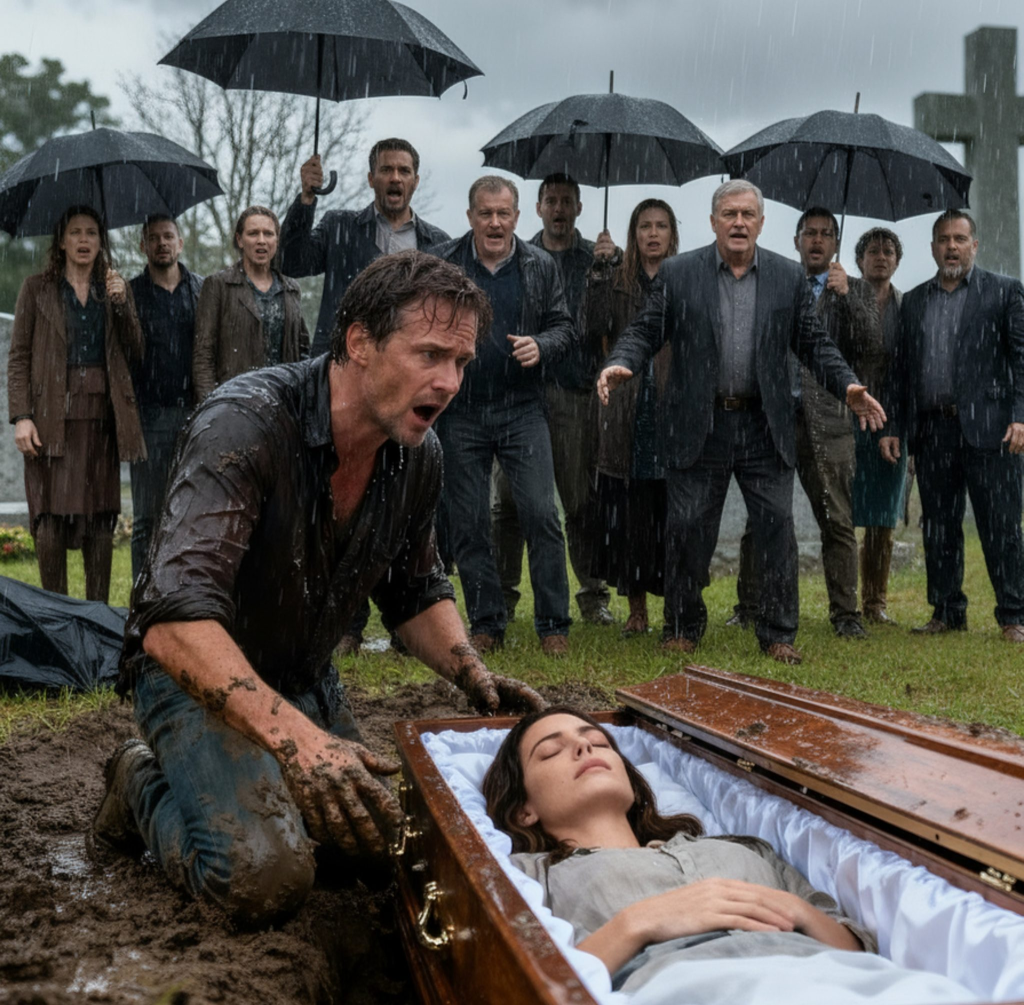The sky hung low over the small English town of Westbridge, heavy with rain and grief. Dark umbrellas gathered around the open grave as the priest’s final prayer faded into the damp air.
Seven-year-old Oliver Gray stood beside his father, his tiny shoes sinking into the mud. Beneath the polished lid of the coffin lay his mother, Margaret—the woman who had kissed him goodnight just two days earlier.

“Father,” Oliver whispered, clutching his father’s sleeve. “She isn’t gone. I heard her.”
Edward Gray looked down, his face hollowed by sorrow. “Oliver, your mother’s at peace now.”
But the boy shook his head so hard that his cap slipped into the mud. “She called me,” he said, voice trembling. “When they closed the box. She said my name.”
The murmurs around the grave fell silent. A sharp wind tore through the cemetery, rattling the trees like a warning. Edward tried to tell himself it was only grief, a child’s desperate refusal to let go—but something in his son’s voice pierced through the fog of denial.
Then Oliver screamed. “Please! Don’t bury her!”
Edward’s hands began to shake. He dropped to his knees, clawing at the wet soil with his bare hands. Gasps rippled through the crowd. A few mourners tried to pull him back, but the terror on Oliver’s face stopped them cold.
Within moments, shovels replaced fingers. Mud flew. The thud of metal striking wood froze every heart. As they hauled the coffin halfway out, Edward fumbled with the latch and threw it open.
What he saw inside shattered the world around him.
Margaret’s eyes were open. Her nails were torn, her fingers bloodied, the satin lining ripped to shreds. There was no doubt—she had been alive.
Edward fell backward into the mud. Oliver cried out for his mother, reaching toward the open coffin. The priest crossed himself, his whisper lost in the storm. No one moved. Then someone ran for the police.
By the time officers arrived, the cemetery looked like a battlefield. Lanterns flickered in the wind as investigators cordoned off the grave. The coroner’s first words confirmed the unthinkable: Margaret Gray had not died of heart failure. She had suffocated inside her coffin.
Detective Amelia Rowan led the inquiry. Inside the caretaker’s office, she questioned Edward while Oliver slept beneath a borrowed coat.
“When was your wife declared dead?” she asked.
“Two days ago,” Edward said weakly. “Dr. Hughes came after breakfast. She fainted… he checked her pulse and said it was over.”
Rowan frowned. “No second opinion? No monitoring?”
“He said there was no need.”
By nightfall, inconsistencies surfaced. Dr. Hughes had not performed an electrocardiogram. He’d spent less than five minutes in the room. Margaret had a history of severe hypoglycemia, but he hadn’t checked her blood sugar.
Hospital records later showed he’d been covering multiple emergencies that morning. Fatigue and haste had cost a woman her life.
When the truth emerged, it spread like wildfire. A mourner had filmed Oliver’s desperate cries—his voice breaking as he shouted, “Please, she’s alive!” The footage flooded social media, then national news.
Public outrage was swift. The hospital suspended Dr. Hughes and launched an inquiry. Journalists surrounded the Gray home, demanding interviews, but Edward refused. He spent his days sitting silently by the window, staring out at the garden Margaret had once tended.
Weeks later, the official medical report arrived.
“Patient experienced reversible diabetic coma. Declared deceased in error. Cause of death: suffocation due to premature burial.”
Edward read the words aloud, his voice cracking. “She was breathing,” he whispered. “And I buried her.”
Months passed before he could speak publicly. When he finally did, his face looked carved from stone. Cameras filled his living room as he addressed the nation.
“I don’t seek vengeance,” he said. “But this must never happen again. A pulse is not proof of death. A mistake like this steals what no apology can return.”
His words sparked a national reckoning. Medical councils convened emergency meetings. Within months, Margaret’s Law was introduced—requiring independent verification and extended observation before any death certificate could be issued outside a hospital.
For Edward and Oliver, though, reform brought little peace. Each night, the boy dreamed of his mother’s voice calling from the dark. Each morning, Edward woke to the echo of her hands beating against the coffin lid.
One gray autumn afternoon, father and son returned to the cemetery. The new headstone gleamed softly under the drizzle. Edward laid a single white tulip beside it.
“You were right, my boy,” he said quietly. “You heard what no one else dared believe.”
Oliver knelt and touched the cold stone. “She wasn’t angry,” he whispered. “She just wanted to say goodbye.”
Edward looked at his son and, for the first time in months, felt something shift—something like peace. The love that had revealed the truth of Margaret’s fate now bound father and son together, stronger than fear, stronger than grief.
That evening, Edward wrote an open letter and shared it online.
“If you ever lose someone suddenly, ask questions. Do not accept silence as certainty. Sometimes love hears what science forgets to listen for.”
By morning, millions had read it. Messages poured in from families, doctors, strangers. A small boy’s voice had changed not only a nation’s laws—but its conscience.
And though rain still fell over Westbridge, one truth would never again be buried:
the courage of a child who refused to stop listening.